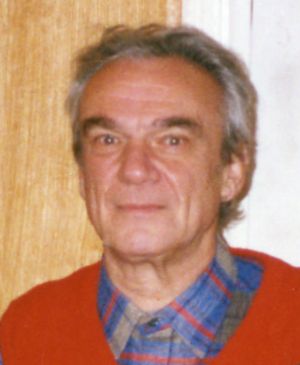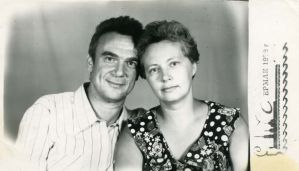Heifetz Michael Ruvimovich (Heifetz Michael, b. 18.01.1934, Leningrad, Russia)
Writer, historian. Samizdat author, political prisoner. Journalist.

Born into a family of an electrician. In 1955, he graduated from the literary department of the Herzen Leningrad Pedagogical Institute. For several years he worked as a teacher of history and geography in the Altai Krai, then returned to Leningrad, taught literature in a high school, took a by-correspondence post-graduate course, from where he was expelled for “unorthodox views”. He began to write fiction. Since the mid-1960s he was a professional writer, member of the writers’ trade union, wrote historical novels, literary critiques, scripts of documentaries, rewriting and editing generals’ memoires. His works were published in magazines "Kostior", "Zwezda", "Voprosy Literatury", and "Avrora" to name a few.
In 1973, Heifetz wrote a preface to the 5-volume collected works of Joseph Brodsky edited by Leningrad writer Vladimir Maramzin for samizdat. This preface (“Joseph Brodsky and our generation”) Heifetz gave for review Efim Etkind, literary critic, and Boris Strugatsky, science fiction writer. Later, in court, writing the preface and its “distribution” became the main episode in charges against Heifetz.
Heifetz was arrested on 22.04.1974. The preface was recognized as "defamatory", especially sharp condemnation by Heifetz of the Warsaw Pact invasion of Czechoslovakia. He was also charged with possession of literary and human rights samizdat (“Chronicle of Current Events”), articles and letters of Petro HRYHORENKO, Alexey Kosterin, and Andrei Amalrik. The case of Heifetz became an example of “pure literary case handled by KGB” when the writer was tried for writing an article about literature.
On 13.09.1974, Heifetz was sentenced by Leningrad City Court under art. 70 part 1 of the CC of the RSFSR (“anti-Soviet agitation and propaganda”) to four years imprisonment in the high security colony and two years of exile. He was promised a pardon in exchange for “repentance”, but Heifetz refused (Maramzin, who accepted the same proposal in February 1975, got a suspended sentence).
In his last word Heifetz said he wanted to write a book about the camp. Later he wrote: “…I was given a pass and sent on a creative mission to a top-secret point of the USSR; I considered myself a special correspondent there. I was supposed not to exert—or so it seemed--influence on the happenings in the zone, but rather to observe and study them in natural environment, conduct an in-depth study the natural logic of behavior of those whose existence in the zone was not accidental, as in my case, but professional nature, i.e. dissidents and administration.”
Heifetz did his term in Mordovia political camps (Dubravlag) - ZhKh-385 / 17A (Village of Ozernyi) and 19 (Village of Lyesnoi). He became good friends with the Armenian and Ukrainian political prisoners (Paruyr AYRIKYAN, Zorian POPADIUK, Vasyl STUS, Vyacheslav CHORNOVIL, Mykola RUDENKO), participated in the solidarity hunger strikes with them (in August 1975 demanding to legalize the National United Party of Armenia, in January 1977 marking the fifth anniversary of the second wave of arrests in Ukraine) and in the struggle for the status of political prisoner.
On 21.04.1977 Heifetz, together with other political prisoners, made a statement announcing transition to the status of political prisoner without preliminary permission and went on 100-day staged hunger strike for the recognition of this status by the administration of the camps. For this he was put into a punishment cell, where he spent forty days. In June, he wrote the “Communiqué on the struggle of political prisoners of the Mordovia camps for political prisoner status”, which had been secretly taken out of the camp and published in the Russkaya Mysl Newspaper. Heifetz wrote and passed to the outside several books: an autobiographical essay Place and Time about life in the camp and struggle of the prisoners for their rights; Russian field, a collection of three interviews of political prisoners (published in the West).
In April 1978, after serving his term in the camp, Heifetz was transported to internal exile in the Town of Ermak, Pavlodar Oblast, Kazakhstan. He worked as a teacher in a high school, then as a methodologist at the training center. There continued his human rights activity. On 04.11.1978, he appealed to Yuri Andropov, Head of the KGB, to intervene in the case of political prisoner of many years Kostiantyn Skrypchuk. He demanded that permission be granted to P.SARANCHUK to leave the USSR. In early 1979, he sent several protests against the trial in Ukraine of V.OVSIYENKO. Later Heifetz described his transportation under guard into internal exile and his life there in the book The Journey from Dubravlag to Ermak.
In January 1980, Heifetz was set free from exile and in March emigrated to Israel.
Heifetz published his works in Russian and Ukrainian emigrant periodicals: such magazines as Kontinent, Kolo, Posev, Trybuna, Suchasnist and Israeli Russian-language magazine “Vremya I My”.
In 1982-1990, he worked as a researcher at the Center for the Study of East European Jewry at the Hebrew University in Jerusalem. Then he devoted his time to journalism.
In his books, written in the camp, and in the collection of essays Ukrainian Silhouettes and in some magazine publications Heifetz created a gallery of portraits of his campmates, mostly leaders of national liberation movements (Ukrainian: V. STUS, V. CHORNOVIL, M. RUDENKO, Z. POPADIUK, V.OVSIYENKO; rebels P.SARANCHUK, M. Konchakivskyi, M. Zhurakivskyy, K. Skrypchuk, V. Kaznovskyi in the section Holy Old Ukrainians; D.K VETSKO, Mykola Hamula, Mykola HUTSUL, Fedir Dron in the section Bandera Children; Armenian: Paruyr AYRIKYAN; Russia: Vladimir Osipov, Sergey Soldatov).
Heifetz lives in Jerusalem. He is a member of the editorial boards of such magazines as “22”, “Glance at Israel”, and “The People and the Land”.
Bibliography
І.
Место и время. Еврейские заметки. – Париж: Третья волна, 1978. – 208 с.; Те ж. Пер. на англ. мову: A Time and a Place / M. Kheifets // Index on censorship. – 1979. – № 5. – P.43-51.
Русский патриот Владимир Осипов // Континент. – 1981. – № 27. – С. 159-214; № 28. – С.134-180.
Про шпионов // Континент. – 1981. – № 29. – С. 249-259. – Совм. с Э.Кузнецовым.
Украинские силуэты : [Сб. очерков]. – Б. м.: Сучаснiсть, 1983. – 287 с. – Те ж. Українські силюети. – Там же, 1984. – 237 с. (укр. мовою)
Военнопленный секретарь: Повесть о Паруйре Айрикяне. – Лондон: OPI, 1985. – 238 с. Переклад на вірм. мову.
Солженицын – глядя из Парижа // Грани. – 1985. – № 137. – С. 305-310.
Українські силюети // Поле відчаю й надії. Альманах. Упоряд. Романа Корогодського. – К.: 1994. – 396 с.
Избранное. В трех томах. Харьковская правозащитная группа. – Харьков: Фолио, 2000. – Т. 1: Место и время. Русское поле. – 272 с.; Т. 2: Путешествие из Дубровлага в Ермак, 1979-1987. – 228 с.; Т. 3: Украинские силуэты. Военнопленный секретарь. – 296 с. Презентація: https://museum.khpg.org/1265145325
Путешествие из Дубравлага в Ермак.
История одного политического преступления. / Харьковская правозащитная группа; худож.-оформитель Б.Захаров. – Харьков: Права людини, 2006. – 256.
Книга счастливого человека / Харьковская правозащитная группа. – Харьков: Права людини, 2010. – 308 с., фотоилл. – 256.
Хейфец М. Р. Українські силуети / М. Р. Хейфец; вступ стаття Б. Є. Захарова; ГО «Харківська правозахисна група». – Харків: ТОВ «Видавництво права людини, 2015. – 328 с. фотоіл.
ІІ.
Дело Хейфеца // Литературные дела КГБ: Дела Суперфина, Эткинда, Хейфеца, Марамзина: В приложении: документы о советской цензуре / Под ред. В. Чалидзе. – Нью-Йорк: Хроника, 1976. – С. 39-71.
Марамзин В. Мой друг Михаил Хейфец // Рус. мысль, №3100.– 1976. – 22 апр.
В.Овсієнко. Мордований союз // Україна – Ізраїль. Журнал літератури, мистецтва, політики. – 1993, № 2.– С. 108-112. – іл.
В.Овсієнко. Про мого друга // Еврейские вести. 1993. – № № 23 – 24 (43 – 44). – Грудень.
Сухорукова Інна. Зустріч у Харкові // Права людини. Інформаційний бюлетень Харківської правозахисної групи. – 2002.– № 22 (278). – 1-15 серпня. – С. 12.
В.Овсієнко. Світло людей: Мемуари та публіцистика. У 2 кн. Кн. І / Упоряд. автор. – Харків: ХПГ; К.: Смолоскип, 2005. – С. 50, 60, 70, 81, 117, 141-149, 300-308; кн. 2. – С. 128, 146, 224, 257, 323, 332-334, 336, 337.
В.Овсієнко. Мордований союз.
Міжнародний біоґрафічний словник дисидентів країн Центральної та Східної Європи й колишнього СРСР. Т. 1. Україна. Частина 2. – Харків: Харківська правозахисна група; „Права людини”, 2006. – C. 791–704.
Рух опору в Україні: 1960 – 1990. Енциклопедичний довідник / Передм. Осипа Зінкевича, Олеся Обертаса. – К.: Смолоскип, 2010. – С. 687–689; 2-е вид.: 2012 р., – С. 773–775.
